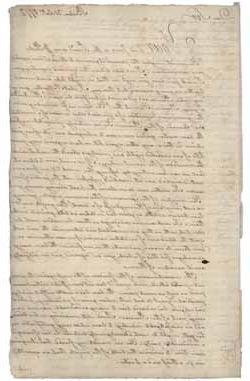Letter from Thomas Young to Hugh Hughes, 21 December 1772
To order an image, navigate to the full
display and click "request this image"
on the blue toolbar.
-
Choose an alternate description of this item written for these projects:
- Main description
[ This description is from the project: Coming of the American Revolution ]
In this letter, Thomas Young, a Boston physician, writes to his friend Hugh Hughes, a schoolmaster in New York, proclaiming that Boston will surely lead the way in educating the public in the virtues and rewards of popular government.
"Saviors of America"
As the "Boston Pamphlet" circulates in Massachusetts, many towns ponder whether to create their own committee of correspondence. Governor Thomas Hutchinson is disturbed by the growing number of towns that seem to be following Boston's lead. On 6 January 1773, he convenes the Massachusetts General Assembly and delivers a speech designed to remind colonists of Parliament's supremacy over the colonies. Meanwhile, supporters of the committee extol its virtues far and wide. Thomas Young, a Boston physician, writes to his friend Hugh Hughes, a schoolmaster in New York, proclaiming that Boston will surely lead the way in educating the public in the virtues and rewards of popular government.
Questions to Consider
1. In the first paragraph, Young mentions Hughes' charge that Massachusetts is suffering under "the ignominious imposition of a pensioned slave." What does this mean? What is Young's response to this claim?
2. How does Young characterize the people of Boston in relation to those of the other colonies (particularly the "southern" colonies)?
3.How does Young justify the failure of the non-importation movement in Boston?
4. What can Hughes (and Bostonians) "never forgive" (page 4)? Why?
Further Exploration
5.In the third paragraph (page 1), Young mentions that the colony has been dealing with "a subtle artful and hypocritical Tyrant." To which political figure do you think he is referring? Why do you think Young would make such comments about this person? What does this comment say about Young's own political viewpoint?
6. Young refers several times to Mein (i.e. John Mein), a Boston publisher. Why is Young so upset with him? Why does he call him an "infamous tool"? (View an example of Mein's work from the non-importation section of the website: The Boston Chronicle, 17-21 August 1769.)
7. Learn more about "De Moivre" (mentioned on page 2). Who is he? What did he do for a living? What can you guess about him from the clue provided in Young's letter?

